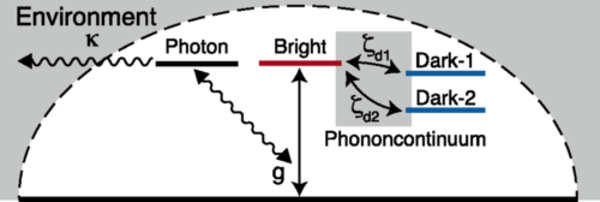Authors
Yasuhiro Yamada, Youhei Yamaji, and Masatoshi Imada
Abstract
Energy dissipation and decoherence are at first glance harmful to acquiring the long exciton lifetime desired for efficient photovoltaics. In the presence of both optically forbidden (namely, dark) and allowed (bright) excitons, however, they can be instrumental, as suggested in photosynthesis. By simulating the quantum dynamics of exciton relaxations, we show that the optimized decoherence that imposes a quantum-to-classical crossover with the dissipation realizes a dramatically longer lifetime. In an example of a carbon nanotube, the exciton lifetime increases by nearly 2 orders of magnitude when the crossover triggers a stable high population in the dark excitons.

Abstract URL:http://journals.aps.org/prl/abstract/10.1103/PhysRevLett.115.197701